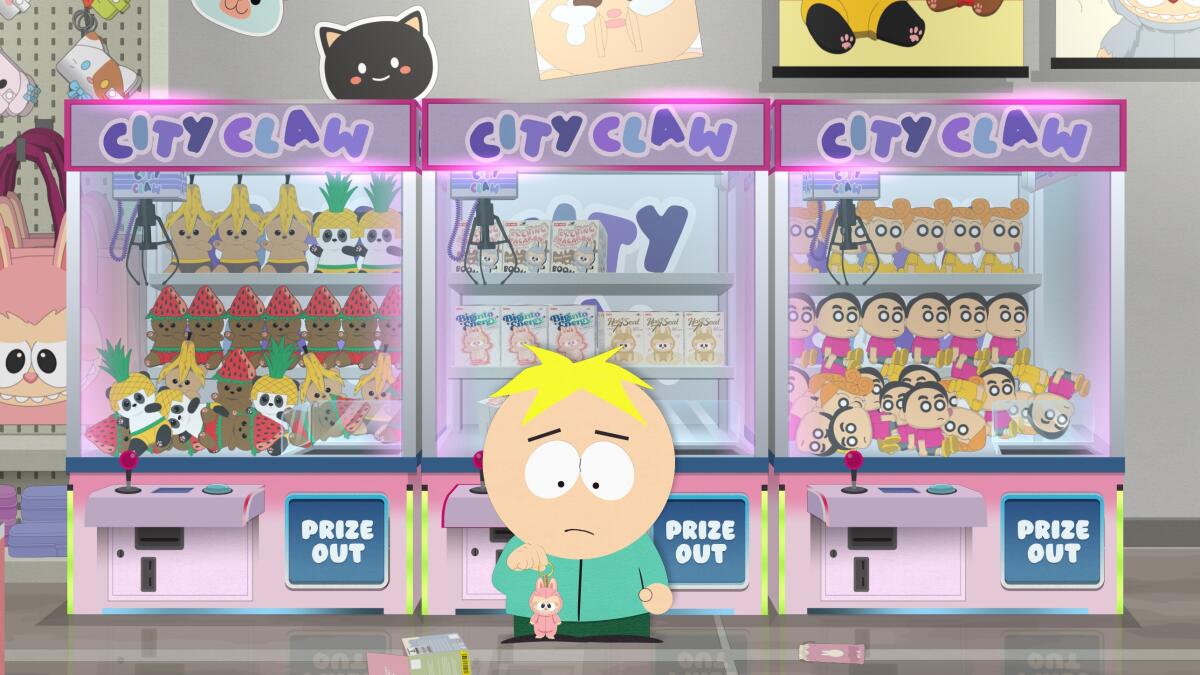‘South Park’: A guide to every Trump-era parody in Season 27
Every episode of “South Park” opens with a disclaimer: “All characters and events in this show — even those based on real people — are entirely fictional. All celebrity voices are impersonated … poorly. The following program contains coarse language and due to its content it should not be viewed by anyone.”
While some of that language must be required by an exhausted legal team behind the scenes, the long-running satirical cartoon is known for pressing hot-button topics and rapidly churning out searing parodies. Season 27, which premiered in July, is no exception, focusing on President Trump, his associates, policies and other current events. Some members of Trump’s cabinet have been outspoken about their likeness appearing in “South Park,” but others have shrugged it off. Over the years, the animated series has depicted conservatives and liberals alike, leaving almost no public figure, politician or activist shielded from critique or crude depiction.
This season has had an unusual cadence of episodes, with the first two arriving on a weekly schedule, then biweekly before the arrival of Episode 5, which aired three weeks later on Wednesday. The delayed episode arrived after the shooting death of conservative activist Charlie Kirk, whose debate style was depicted in the Episode 2. However, “South Park” creators Matt Parker and Trey Stone told the Denver Post the delay was unrelated to recent events, like Jimmy Kimmel’s suspension, or the content: “No one pulled the episode, no one censored us, and you know we’d say so if true.” The pair had issued a statement on Sept. 17 saying the episode wasn’t finished in time. Future episodes will air every two weeks through Dec. 10.
Here is a guide to every parody and reference so far on this season of “South Park.”
This story will be updated with each new episode.
‘Sermon on the ‘Mount,’ Episode 1

Cartman in “Sermon on the ‘Mount.”
(Comedy Central)
Cutting funding to the Corp. for Public Broadcasting
Cartman is dismayed to find out National Public Radio has lost its federal funding after he tunes in to hear static — an NPR program is his “favorite show,” he says, where “all the liberals b— and whine about stuff.” He rants to his friends about how the government “can’t cancel a show” and wonders what might be next on the chopping block.
In July, the Senate voted to approve the Trump White House’s proposal to claw back roughly $1 billion in federal funding previously allocated for public broadcasting. NPR and PBS are still operating despite the funding cuts, but layoffs and reduced programming are expected.
Christianity in public schools
Head of South Park Elementary PC Principal, whose name was a play on the initialism for politically correct, announces to the school that his name now stands for “Power Christian Principal.” He holds an assembly where he says that “our Lord and savior Jesus Christ” is the only thing that can bring back some normalcy to these “corrupt times.” He proceeds to welcome Jesus to the assembly as a guest speaker. When the students go back home, their parents and the people of South Park are alarmed to hear about the emphasis on Christianity — and the presence of Jesus — in the town’s public school.
Trump has previously endorsed displaying the Ten Commandments in classrooms amid a push to incorporate more Christianity into public schools.
‘Woke is dead’
The phrase frequently used by Trump was inscribed on a T-shirt Cartman wears after he realizes the concept of “wokeness” is no longer prominent. “Everyone hates the Jews, everyone’s fine with using gay slurs,” he says, lamenting that he no longer feels purpose if there’s no wokeness to contest.
Karoline Leavitt
The White House press secretary is depicted corralling the president, sporting a large cross necklace, as she often does during press briefings. Leavitt tells Trump a lot of his supporters are starting to turn against him and begs him to talk to them, adding that they’re “really riled up.” Trump’s base has expressed frustration over the administration’s approach to sharing information about the Jeffery Epstein case after he promised more transparency about the convicted sex offender, who died by suicide in 2019, and the sex trafficking investigation involving the late financier.
President Trump
Trump appears this season with an image of his face over an animated body, frequently repeating the phrase “Relax, guy” and threatening lawsuits against anyone who’s in his way. He is shown berating a White House portrait painter for an unflattering depiction of him and there are references to the size of the president’s genitalia. He’s also depicted as being in an abusive relationship with Satan — in which Trump is the abuser. “South Park” has previously depicted Satan as being the victim in an abusive relationship with Saddam Hussein.
The Epstein list
Satan laments the speculation that Trump’s name is on the “Epstein list,” a purported list of his alleged clients. In reality, the Justice Department has said no such list exists, walking back comments Atty. Gen. Pam Bondi made in a Fox News interview earlier this year that the list was “sitting on my desk” in preparation for release. When the list is brought up in the series, fictional Trump says, “Are we still talking about that?,” mirroring comments he made in real life.
CBS’ ’60 Minutes’ and Paramount drama
The stopwatch featured in the introduction to “60 Minutes” is strapped to a bomb when it appears on “South Park.” The hosts of the show are visibly nervous and continue praising the president while covering his lawsuit against the town of South Park, adding that they don’t agree with Trump’s detractors.
The scene references the legal tussle between Trump and Paramount Global, the parent company of CBS, which airs “60 Minutes.” The president sued over edits to a “60 Minutes” interview with then-Vice President Kamala Harris, which led to Paramount agreeing to pay $16 million to settle the lawsuit in July; shortly after, the Federal Communications Commission, led by a Trump appointee, approved Paramount’s merger with Skydance.
Between the settlement and merger approval, CBS announced it is canceling “The Late Show With Stephen Colbert.” Colbert frequently skewers the president on his show, and Trump praised the cancellation. Paramount also recently bought the global streaming rights to “South Park” in a lucrative $1.5-billion deal for Parker and Stone.
During the episode’s fictitious “60 Minutes” segment over Trump’s lawsuit against the town, Jesus comes to visit the townspeople. Through whispers, he tells them, “I didn’t want to come back and be in the school, but I had to because it was part of a lawsuit and the agreement with Paramount.”
“The president’s suing you?” a protester asks.
Jesus, through clenched teeth, explains: “The guy can do what he wants now that someone backed down. … You guys saw what happened to CBS? Well, guess who owns CBS? Paramount! You really want to end up like Colbert? You guys gotta stop being stupid. … If someone has the power of the presidency and also has the power to sue and take bribes, then he can do anything to anyone.”
“All of you, shut the f— up or South Park is over!” Jesus says.
The people of South Park end up settling their lawsuit with the president for $3.5 million, saying it will be fine as long as they cut some funding for their schools, hospitals and roads. And as part of the settlement, they have to agree to “pro-Trump messaging.” Cut to a live-action deepfake video of Trump trekking through the desert in a show of loyalty to his supporters before he strips naked.
‘Got a Nut,’ Episode 2

Cartman becomes a podcaster in Episode 2.
(Comedy Central)
Note: This episode aired on Aug. 6, more than a month before political commentator Charlie Kirk, who is parodied throughout the episode, was shot and killed.
ICE recruitment and immigration raids
This episode is focused on the ongoing raids carried out across the country by Immigration and Customs Enforcement and Department of Homeland Security officials since earlier this year.
When South Park Elementary counselor Mr. Mackey is fired — the government is doing away with needless spending in schools, he’s told — he signs up for a job with ICE, enticed by a generous signing bonus and a higher salary. Mackey watches a promotional video, complete with animations of officers wearing gaiters and a theme song: “We don’t ask for experience, just show up / We don’t care if you’ve read a book or grown up / If you’re crazy or fat and lazy, we don’t care at all … If you need a job, it’s a job to have.”
Mackey is hired with alarming speed and proceeds to go on his first raid, targeting a “Dora the Explorer” live show, which has a not-so-intimidating audience of young children and abuelitas. After ICE agents hear from protesters that there are “many Latinos in heaven,” they make the pearly gates their next stop.
Kristi Noem
The Department of Homeland Security secretary leads ICE agents through a series of raids this episode, but she first appears in an orientation video. She tells the new recruits, “A few years ago, I had to put my puppy down by shooting it in the face because sometimes doing what’s important means doing what’s hard,” and she proceeds to going on a shooting spree targeting yelping puppies (including Krypto the Superdog) throughout the episode. In her 2024 book, Noem wrote about how she killed her 14-month-old dog for exhibiting aggressive behavior.
She’s also seen rounding up as many immigrants as possible in raids, shouting orders like, “If it’s brown, it goes down.”
And in a running gag, her face periodically melts off, requiring a glam squad equivalent to a pit crew, and at one point, it seems to take on a life of its own. Trump also says her face “freaks me out” during the episode.
Noem responded to the depiction on Glenn Beck’s podcast, calling it “lazy” to target her looks. “If they wanted to criticize my job, go ahead and do that, but clearly they can’t, they just pick something petty like that,” she said.
Right-wing debate podcasts
While conservative political commentator Charlie Kirk does not appear as a character in this episode, his style of debate content — and his name — are featured.
Loudmouthed Cartman is frustrated that so many others, namely his classmate Clyde Donovan, are profiting off of “his shtick” of arguing against liberal views.
Clyde has a debate podcast, inviting viewers to watch as he “totally destroys these woke liberal students.” He’s set up in a tent on a college campus where he waits as a line of students come to speak with him, and he challenges them to “prove me wrong.” Cartman eventually takes over, saying that he is the “master debater” and sporting a haircut similar to Kirk’s. He shuts down his opponents’ arguments with phrases like, “You just hate America and you love abortions.”
Clyde and Cartman’s content replicates Kirk’s well-known style. The founder of the conservative organization Turning Point USA frequently toured college campuses and hosted events just like the one depicted in the episode. The phrase “prove me wrong” was used frequently by Kirk to promote his events, inviting students to challenge his political and cultural views.
On Sept. 10, Kirk was shot and killed while hosting such an event at Utah Valley University, the first stop of his “American Comeback” tour. Weeks before he was killed, Kirk responded to the episode with a 30-minute YouTube video, finding it humorous.
“I think a lot of it was hilarious towards me,” he said. “Some of it was very funny and I don’t think we should have too thick of skin.”
He also touched on the reach of his organization and events, noting that his name is enshrined in “The Charlie Kirk Award for Young Masterdebaters” that Cartman and Clyde compete for in the episode. “So a campus thing I’ve been doing for 13 years to debate random college kids has now been so important that it gets prominent prime-time placement on Comedy Central?” he asked through laughs. “I think the whole thing is just awesome and hilarious.”
Mar-a-Lago
When Mr. Mackey is rewarded for good work as an ICE agent, he’s flown to Trump’s Mar-a-Lago estate, where he frequently stays and hosts events.
He’s greeted by giggling women who hand him a drink and put flower leis around his neck before the president meets him and gives him a brief tour of Mar-a-Lago. While there, Mackey accidentally walks in on two older men receiving massages from younger women, one of whom is a tearful Dora, detained in the raid that took place earlier in the episode. The scene is likely a reference to Epstein and accounts from survivors who say they were forced to give massages to him and his associates. Trump said this summer that Epstein “stole” young women who worked at the Mar-a-Lago spa, which caused them to have a falling-out.
JD Vance
The vice president is depicted as a version of Tattoo, the character from late-’70s drama “Fantasy Island,” and is animated similarly as Trump, except the photo used for his face is lifted directly from viral memes. He often does the president’s bidding, calling him “boss.” In turn, Trump frequently calls Vance “stupid.” Acknowledging the caricature, Vance wrote on X, “Well, I’ve finally made it.”
‘Sickofancy,’ Episode 3

Randy begins microdosing ketamine and Towelie goes to Washington, D.C., in this episode.
(Comedy Central)
Immigration raid at cannabis farm
Randy’s hemp farm business, Tegridy Farms, is the site of an immigration raid at the the beginning of this episode. While Randy is shooting a commercial, complete with calming guitar music and a trite script, ICE officers interrupt by detaining almost all the workers. “You sons of b—,” Randy screams after the vans as they drive away. “Those are my Mexicans!”
In July, chaotic raids targeting a cannabis company’s growing site and greenhouse in Santa Barbara and Ventura counties drew national attention after a man who was fleeing immigration officials died.
Microdosing ketamine
With his business in shambles, Randy rethinks his strategy with the help of an over-complimentary AI chatbot. Perhaps in a nod to Trump’s former ally and onetime “special government employee” Elon Musk, the billionaire businessman behind Tesla, SpaceX and X, Randy turns to ketamine. Randy insists a slew of “tech guys” are taking small doses of ketamine and the drug “gives their minds the edge to work with AI.” Ketamine “bolsters our focus and creativity,” he tells his partner Towelie. Under the influence of the drug, Randy transforms Tegridy Farms from a “quaint farm” into an “AI-powered marijuana platform for global solutions.”
Musk’s use of ketamine and other drugs has been previously reported, with the tech leader saying in a 2024 interview that ketamine has been prescribed to him and is “helpful for getting one out of a negative frame of mind.” He has denied abusing it. “If you use too much ketamine, you can’t really get work done. I have a lot of work, I’m typically putting in 16-hour days,” he said. “So I don’t really have a situation where I can be not mentally acute for an extended period of time.”
Musk supported Trump’s campaign and served as an advisor to the president, helming the Department of Government Efficiency earlier this year with the goal of slashing spending.
Mark Zuckerberg and Tim Cook
Meta and Apple chief executives Mark Zuckerberg and Tim Cook, who were both present at Trump’s inauguration and have maintained friendly relationships with him, are both portrayed in this episode as members of a long line outside of the Oval Office waiting to bestow a gift on the president.
“Mr. President, your ideas for the tech industry are so innovative,” Cook says to Trump. Cook gives the president a gift on behalf of Apple, which actually happened this summer. Zuckerberg is later seen giving the president a gift that appears to be a gold and bejeweled Meta virtual reality headset.
Luxury jet from Qatar
Qatar’s leader is also seen in line holding a model gold plane with a tag that says “Air Force One.” Like everyone else, the leader compliments the president and insists his genitalia is not small before giving him the gift. Trump and the Defense Department accepted a luxury Boeing 747 aircraft from Qatar for President Trump to use as Air Force One this summer, despite ongoing questions about the ethics and legality of taking the expensive gift from a foreign nation.
Washington, D.C.
When Towelie takes a trip to the capital in this episode, he sees armed troops guarding monuments like the Washington and Lincoln memorials and the Capitol surrounded by tanks and jets. In the episode, the Lincoln Memorial has been replaced by a statue of a stern-faced Trump with exposed genitalia.
In August, Trump called up National Guard troops to Washington, D.C., to assist federal law enforcement in his bid to “reestablish law and order” by targeting criminals — though crime has been down in the city — and the homeless. Although troops were not initially armed, Defense Secretary Pete Hegseth later ordered them to carry service-issued weapons.
Reclassifying marijuana
Randy sends Towelie to meet with Trump and give him a gift in hopes of persuading him to reclassify marijuana on the national level. (The gift is Towelie himself.) Randy, in the form of a hologram, tells Trump he thinks they can work out a mutually beneficial arrangement.
Trump said in an August press conference that his administration was considering reclassifying marijuana as a less dangerous drug, which would be a significant change in policy but would not make the drug legal across the country.
‘Wok is Dead,’ Episode 4

Butters buys a Labubu for his girlfriend.
(Comedy Central)
Tariffs and Labubus
The clerk at the City Pop-Up — rebranded from City Wok — the lone purveyor of Labubus in the area, says the popular dolls are hard to keep in stock, and they’re very expensive because of tariffs. The “mystery box” that Butters has to purchase for the chance of getting the exact Labubu his girlfriend wants sets him back $85, and later, the price shoots up to $120 to offset a rise in tariffs. (The real-life dolls often fetch much more than that on resale sites, especially if they are rare.) When Butters balks at the price, the store owner explains that the cost of tariffs is passed onto the customer.
Fox News
This episode shows a clip from a Fox News segment where an anchor is overly complimentary of the president. The anchor says the president will take questions from a “diverse crowd of reporters” after returning to the U.S. from a historic tariff summit, only to reveal all of the reporters are from Fox.
The Fox News reporters also fixate on President Trump’s relationship with his wife, Melania, and his increasingly frequent appearances with Satan. There’s a heavy use of wordplay that suggests the anchors could be asking about the affair between the president and Satan or about whether Trump is actually the devil himself.
Kid Rock
Fox News reporters check in with Trump ally Kid Rock after breaking the news that — buckle up — Trump has impregnated Satan. A sobbing Kid Rock tells the reporters, “I’m just so happy.” The musician is a friend and ardent supporter of Trump, having performed at his inaugural rally in January and spoken many times publicly about his support of the president.
‘Conflict of Interest,’ Episode 5

South Park Season 27, Episode 5 “Conflict of Interest”
(Comedy Central)
Israel and Gaza
Kyle becomes irate when his classmates place bets on a popular market prediction app that his mother would “strike Gaza and destroy a Palestinian hospital.”
This episode marks the first time this season that the show has touched on the current conflict in Gaza, and it referenced real-life Israeli strikes on hospitals in the area.
Donald Trump Jr.
Trump’s eldest son appears in this episode as someone with many roles — he’s a strategic advisor for predictive markets, he answers the phone for the Commodity Futures Trading Commission and also acts as a special advisor to Israel. Although he wears all those hats, the series doesn’t portray him as particularly bright — he has a complete conversation over the phone with himself.
He’s also animated to look as if he’s had extensive plastic surgery and he speaks with a strained voice, as if he can’t move his face.
Trump Jr. holds several key roles in his family’s business and his father’s political sphere in real life, and he serves as an advisor to both Polymart and Kalshi, two prediction market apps that are named and spoofed in this episode.
Trump’s stance on abortion
Less keen on the baby he’s expecting with Satan, Trump looks for different ways to harm the pregnancy in hopes of terminating it. He asks Satan if he wants to smoke and hang out in a hot tub, holds up a wire hanger, tries to get him to trip down the stairs or fall under a pile of cat feces, and even makes Satan a soup full of emergency contraceptive pills.
In reality, Trump has repeatedly shifted his messaging on abortion but has most recently said he believes specific abortion policies and access should be decided not by federal law but by individual states.
Brendan Carr
The chairman of the Federal Communications Commission comes into the fold this episode when Kyle goes through several hoops to try to file a complaint over the bet involving his mom, which he finds offensive. The FCC is “dealing with all the offensive stuff now,” Kyle is told.
Carr says he needs to speak with the president after learning about the offensive content, but he ends up falling victim to all of Trump’s antics in his attempt to terminate Satan’s pregnancy, which send him to the hospital. The doctors say they’re “afraid he may lose his freedom of speech.”
Vance later threatens Carr, who keeps interfering with Trump’s attempts to end Satan’s pregnancy (Vance doesn’t want anything to mess with his proximity to the presidency). “We can do this the easy way, or we can do this the hard way,” Vance says to Carr.
Those words match the phrase Carr said in real life a week before this episode aired in reference to his call on ABC to act on comments late-night host Jimmy Kimmel made about Kirk’s suspected killer and his death. Carr has remained in the headlines since then as backlash grew against the FCC’s role in Kimmel’s suspension.
Benjamin Netanyahu
Frustrated by the bet about her and the ongoing conflict in Gaza, Kyle’s mom storms into the office of the Israeli prime minister. “Just who do you think you are, killing thousands and flattening neighborhoods, then wrapping yourself in Judaism like it’s some shield from criticism?” she says. “You’re making life for Jews miserable and life for American Jews impossible.” She continues to berate him and a group of officials while the credits roll. Netanyahu does not say anything in response.



